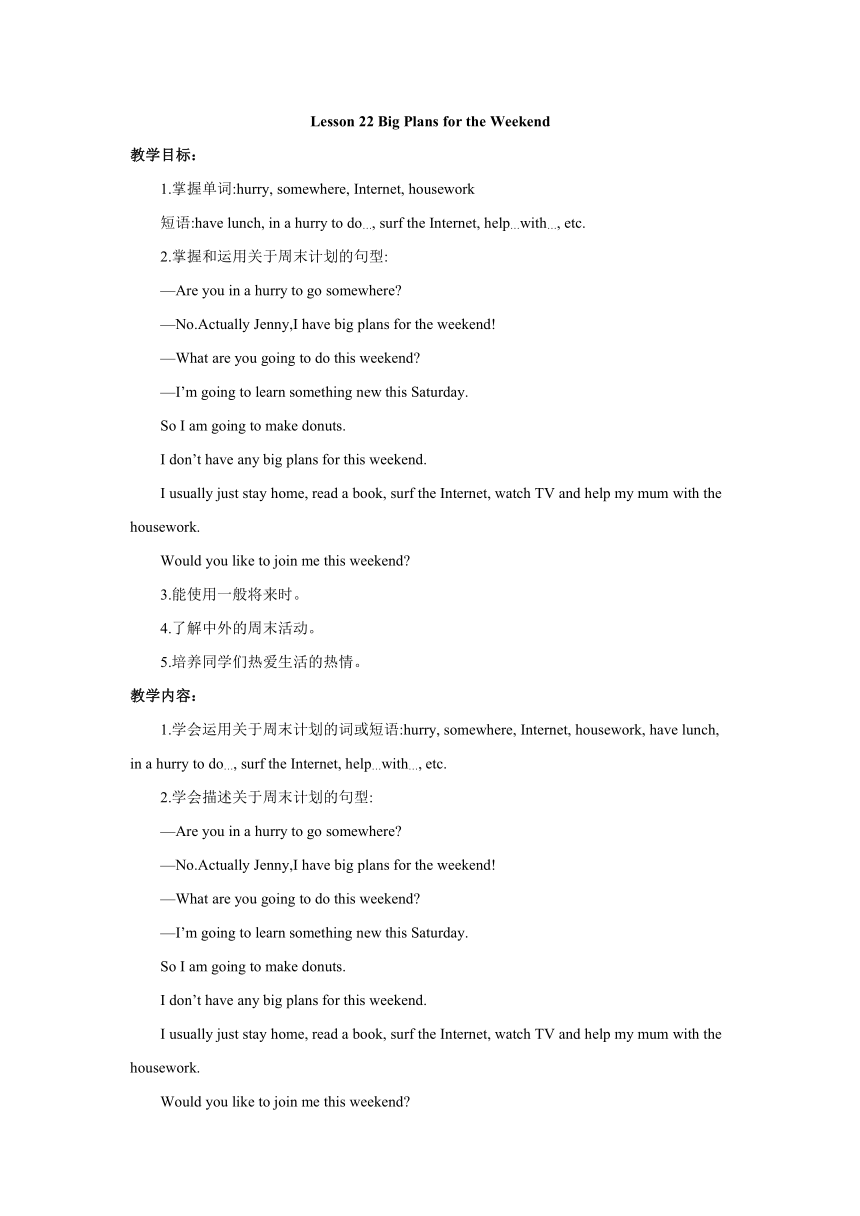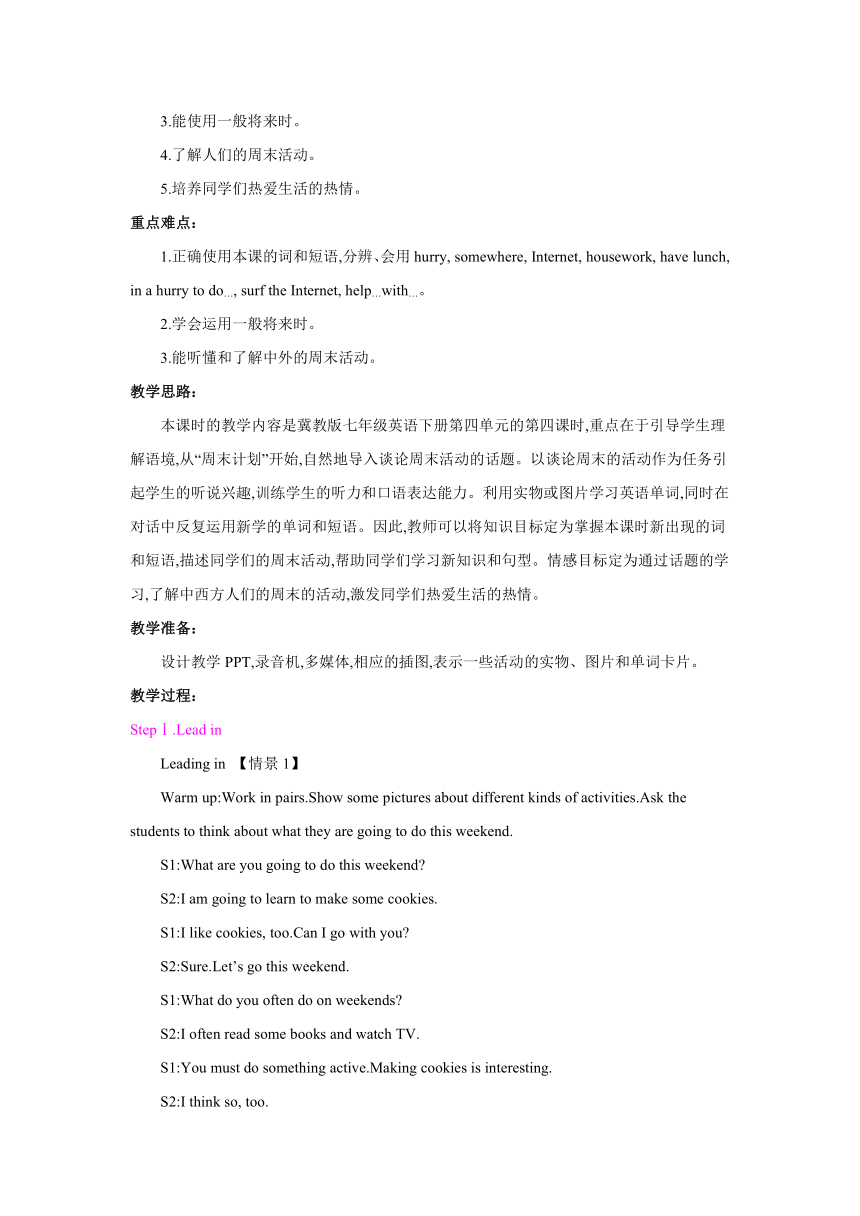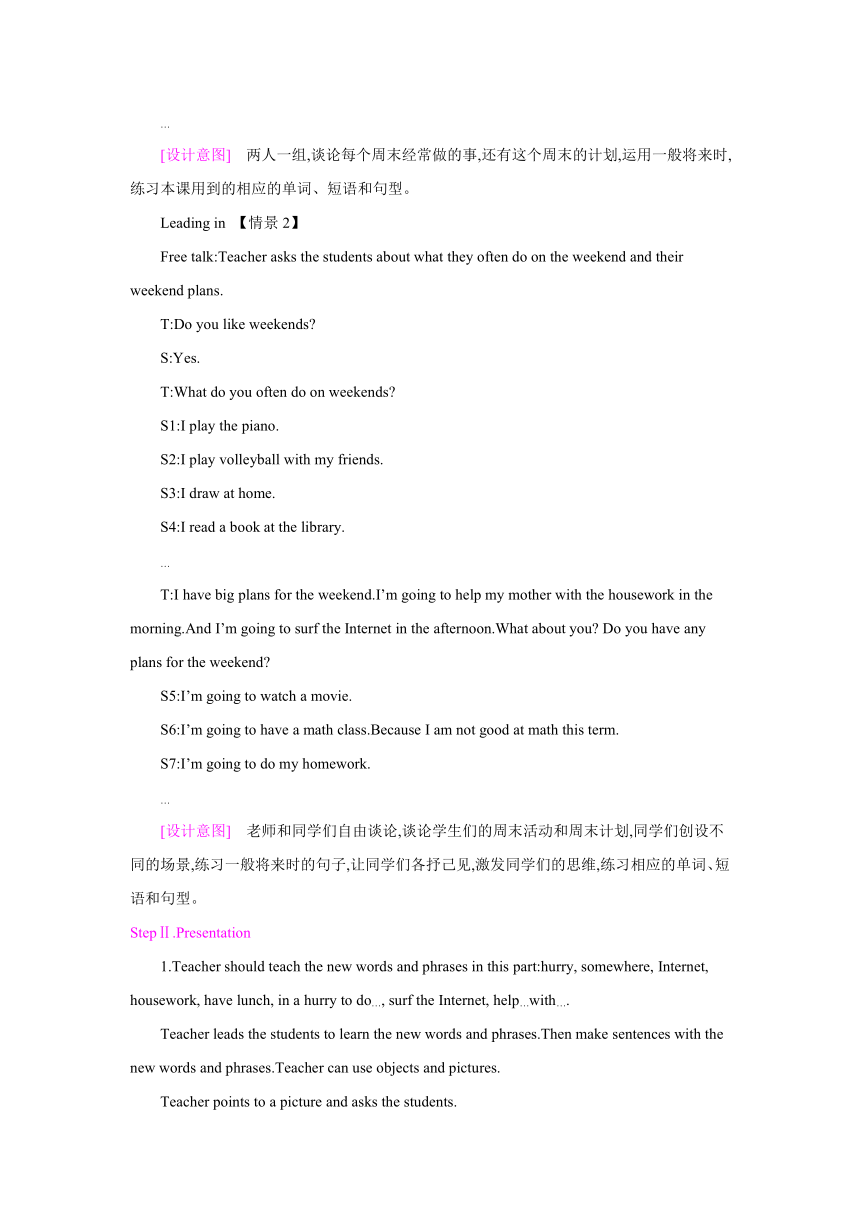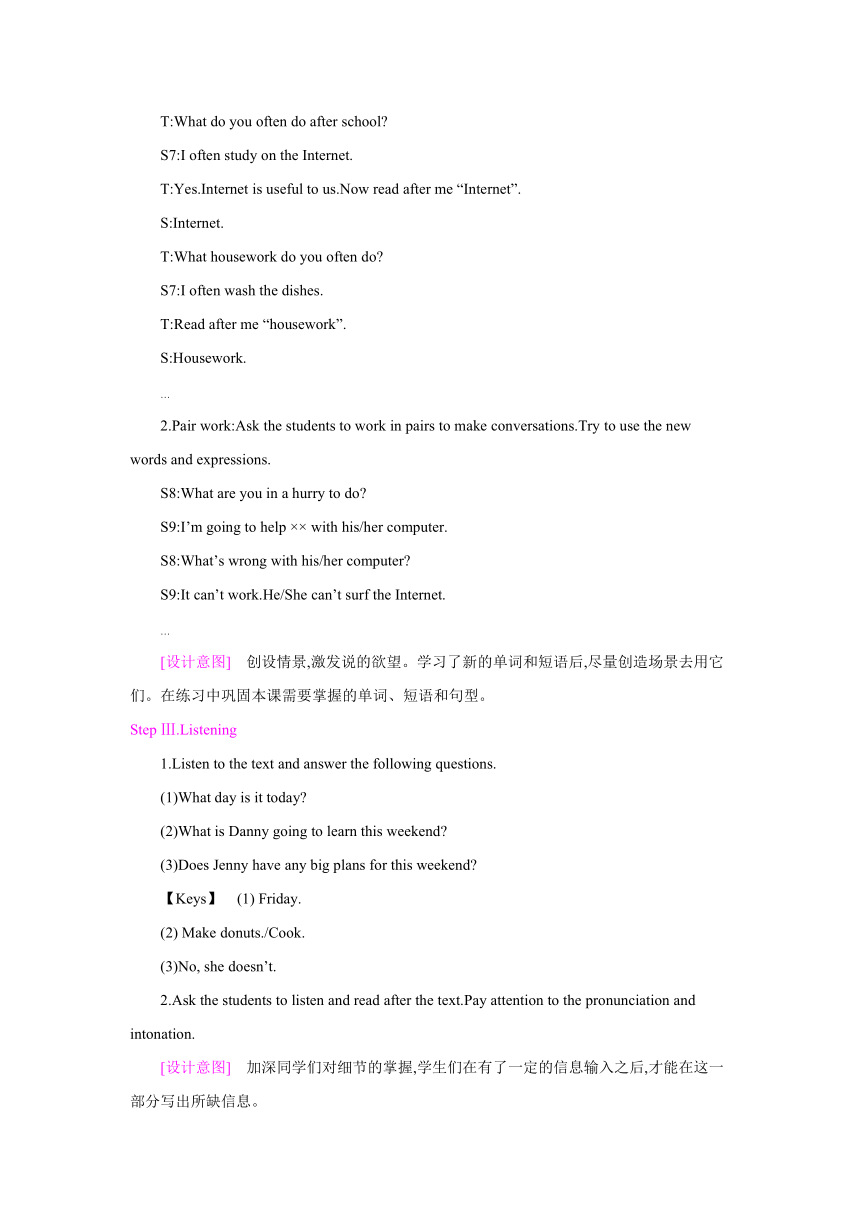Unit 4 After-School Activities Lesson 22 Big Plans for the Weekend 教学设计
文档属性
| 名称 | Unit 4 After-School Activities Lesson 22 Big Plans for the Weekend 教学设计 |

|
|
| 格式 | zip | ||
| 文件大小 | 27.2KB | ||
| 资源类型 | 教案 | ||
| 版本资源 | 冀教版 | ||
| 科目 | 英语 | ||
| 更新时间 | 2019-06-27 11:05:41 | ||
图片预览




文档简介
Lesson 22 Big Plans for the Weekend
教学目标:
1.掌握单词:hurry, somewhere, Internet, housework
短语:have lunch, in a hurry to do…, surf the Internet, help…with…, etc.
2.掌握和运用关于周末计划的句型:
—Are you in a hurry to go somewhere?
—No.Actually Jenny,I have big plans for the weekend!
—What are you going to do this weekend?
—I’m going to learn something new this Saturday.
So I am going to make donuts.
I don’t have any big plans for this weekend.
I usually just stay home, read a book, surf the Internet, watch TV and help my mum with the housework.
Would you like to join me this weekend?
3.能使用一般将来时。
4.了解中外的周末活动。
5.培养同学们热爱生活的热情。
教学内容:
1.学会运用关于周末计划的词或短语:hurry, somewhere, Internet, housework, have lunch, in a hurry to do…, surf the Internet, help…with…, etc.
2.学会描述关于周末计划的句型:
—Are you in a hurry to go somewhere?
—No.Actually Jenny,I have big plans for the weekend!
—What are you going to do this weekend?
—I’m going to learn something new this Saturday.
So I am going to make donuts.
I don’t have any big plans for this weekend.
I usually just stay home, read a book, surf the Internet, watch TV and help my mum with the housework.
Would you like to join me this weekend?
3.能使用一般将来时。
4.了解人们的周末活动。
5.培养同学们热爱生活的热情。
重点难点:
1.正确使用本课的词和短语,分辨、会用hurry, somewhere, Internet, housework, have lunch, in a hurry to do…, surf the Internet, help…with…。
2.学会运用一般将来时。
3.能听懂和了解中外的周末活动。
教学思路:
本课时的教学内容是冀教版七年级英语下册第四单元的第四课时,重点在于引导学生理解语境,从“周末计划”开始,自然地导入谈论周末活动的话题。以谈论周末的活动作为任务引起学生的听说兴趣,训练学生的听力和口语表达能力。利用实物或图片学习英语单词,同时在对话中反复运用新学的单词和短语。因此,教师可以将知识目标定为掌握本课时新出现的词和短语,描述同学们的周末活动,帮助同学们学习新知识和句型。情感目标定为通过话题的学习,了解中西方人们的周末的活动,激发同学们热爱生活的热情。
教学准备:
设计教学PPT,录音机,多媒体,相应的插图,表示一些活动的实物、图片和单词卡片。
教学过程:
StepⅠ.Lead in
Leading in 【情景1】
Warm up:Work in pairs.Show some pictures about different kinds of activities.Ask the students to think about what they are going to do this weekend.
S1:What are you going to do this weekend?
S2:I am going to learn to make some cookies.
S1:I like cookies, too.Can I go with you?
S2:Sure.Let’s go this weekend.
S1:What do you often do on weekends?
S2:I often read some books and watch TV.
S1:You must do something active.Making cookies is interesting.
S2:I think so, too.
…
[设计意图] 两人一组,谈论每个周末经常做的事,还有这个周末的计划,运用一般将来时,练习本课用到的相应的单词、短语和句型。
Leading in 【情景2】
Free talk:Teacher asks the students about what they often do on the weekend and their weekend plans.
T:Do you like weekends?
S:Yes.
T:What do you often do on weekends?
S1:I play the piano.
S2:I play volleyball with my friends.
S3:I draw at home.
S4:I read a book at the library.
…
T:I have big plans for the weekend.I’m going to help my mother with the housework in the morning.And I’m going to surf the Internet in the afternoon.What about you? Do you have any plans for the weekend?
S5:I’m going to watch a movie.
S6:I’m going to have a math class.Because I am not good at math this term.
S7:I’m going to do my homework.
…
[设计意图] 老师和同学们自由谈论,谈论学生们的周末活动和周末计划,同学们创设不同的场景,练习一般将来时的句子,让同学们各抒己见,激发同学们的思维,练习相应的单词、短语和句型。
StepⅡ.Presentation
1.Teacher should teach the new words and phrases in this part:hurry, somewhere, Internet, housework, have lunch, in a hurry to do…, surf the Internet, help…with….
Teacher leads the students to learn the new words and phrases.Then make sentences with the new words and phrases.Teacher can use objects and pictures.
Teacher points to a picture and asks the students.
T:What do you often do after school?
S7:I often study on the Internet.
T:Yes.Internet is useful to us.Now read after me “Internet”.
S:Internet.
T:What housework do you often do?
S7:I often wash the dishes.
T:Read after me “housework”.
S:Housework.
…
2.Pair work:Ask the students to work in pairs to make conversations.Try to use the new words and expressions.
S8:What are you in a hurry to do?
S9:I’m going to help ×× with his/her computer.
S8:What’s wrong with his/her computer?
S9:It can’t work.He/She can’t surf the Internet.
…
[设计意图] 创设情景,激发说的欲望。学习了新的单词和短语后,尽量创造场景去用它们。在练习中巩固本课需要掌握的单词、短语和句型。
Step Ⅲ.Listening
1.Listen to the text and answer the following questions.
(1)What day is it today?
(2)What is Danny going to learn this weekend?
(3)Does Jenny have any big plans for this weekend?
【Keys】 (1) Friday.
(2) Make donuts./Cook.
(3)No, she doesn’t.
2.Ask the students to listen and read after the text.Pay attention to the pronunciation and intonation.
[设计意图] 加深同学们对细节的掌握,学生们在有了一定的信息输入之后,才能在这一部分写出所缺信息。
Step Ⅳ.Reading
1.Read the lesson and finish Exercise 2 in Let’s Do It.
Read the lesson and answer the questions.
(1) Why can’t Danny stay still today?
(2)What does Jenny usually do on weekends?
(3)What is Jenny going to do this weekend?
【Keys】 (1)Because he has big plans for the weekend! He can’t wait.It’s going to be a good weekend!
(2)She usually just stays home, reads a book, surfs the Internet, watches TV and helps her mum with the housework.
(3)She is going to join Danny to make donuts.
2.Read the text; ask and answer questions.
Group work:Read the text first, then ask at least 3 questions.After a while, you can ask anyone in the class to answer the questions.
Group 1:
(1)What are Danny and Jenny doing?
(2)What is Danny going to learn this Saturday?
(3)Would Jenny join Danny this weekend?
【Keys】 (1)They are having lunch.
(2)Something new/Make donuts.
(3)Yes, she’d.
3.Ask the students to read the text.
T:Now let’s read the text.At the same time, pay attention to the pronunciation and intonation.
Ask some pairs to read aloud in class.
T:Now let’s see who can read best.
4.Read and find the key points.
The following language points should be explained.
☆教材解读☆
1.You can’t stay still today.?
still用作形容词,意为“静止的”。
The doctor asked me to stay still.
医生让我不要动。
【拓展】 still 作副词使用时,含有“仍旧,还”之意,表示某事仍在继续,多用于肯定句或疑问句之中。
My mother is still cooking.我妈妈还在做饭。
Her arm still hurts.她的胳膊还在痛。
2.Are you in a hurry to go somewhere??
in a hurry意为“匆忙地”,在句中作表语或状语。
Li Ming, why are you in such a hurry?
李明,你为什么这么匆忙呢?
She left the office in a hurry.
她匆忙离开了办公室。
【拓展】 hurry up 意为“赶快”,只用于肯定句或单独使用,在否定句中要用 hurry;hurry off或hurry away 表示“匆匆离去 ”。
Hurry up, or you’ll be late.
快点儿,否则就迟到了。
The doctors hurried off.医生们匆忙离开了。
3.I can’t wait.?
wait用作动词,意为“等”。它的用法如下:
(1)wait for sb./sth.意为“等某人或某物”。
She is waiting for her mum.她在等她的妈妈。
They are waiting for the bus.
他们在等公共汽车。
(2)can’t wait to do意为“迫不及待做某事”。
My sister can’t wait to open the gifts.
我妹妹迫不及待地打开礼物。
4.I usually just stay home, read a book, surf the Internet, watch TV and help my mum with the housework.?
◆stay home意为“待在家里”。
Would you like to stay home this weekend?这个周末你想要待在家里吗?
◆help sb.with sth.意为“帮助某人做某事”。同义短语为:help sb.(to) do sth.。
My mum often helps me with my English.
我妈妈经常帮我学英语。
[设计意图] 朗读比赛能激发学生的读书欲望,给学生们提供展示的机会。读书找到关键信息这个任务,能提高同学们的阅读理解能力。
StepⅤ.Practice
1.Ask the students to retell the story with their own words.
2.Pair work:Ask the students to talk about their weekend plan.
S1:Do you have any plans for this weekend?
S2:Yes,I have many things to do.
S1:What are you going to do?
S2:I will go shopping with my friends and watch a movie at night.
S1:They are good plans.Can I go with you?
S2:Yes.We can go together.
…
3.Work in groups:Ask your group members if they want to learn something new.Write their answers and make a report in front of the class.
Now discuss for several minutes.Then ask some groups to show their reports.
Group 1:I have many good friends.They are active.They want to learn something new.Tom likes cooking.He wants to learn to cook Western food and Eastern food.Mary loves music.She wants to learn to play the guitar.She says guitar can make her life colourful.I like stories.I want to learn to write stories for children.
[设计意图] 学为所用,小组合作,谈论你的小组成员想要学习什么,并且做一个报告,完成这个任务有助于培养学生运用目标语言进行交际的能力。重述故事考查同学们对课文细节的理解和记忆。
Step Ⅵ.Complete Let’s Do It!
We have finished Exercise 2 in reading part.Ask the students to finish Exercise 1 and Exercise 3 by themselves.Check the answers in class.
[设计意图] Let’s Do It!部分中的Exercise 2是阅读教学,我们在课上在阅读部分完成了任务。Exercise 1是听力教学,主要考查同学们对课文的准确信息的记忆能力。Exercise 3主要考查同学们对本课单词的熟练程度。
Step Ⅶ.Task
Work in groups.Danny needs your help.He is writing a report for the school newspaper.His topic is “Fun things to do on weekends”.Answer his questions and help him write a great report.
(1)What do you usually do on weekends?
(2)Do you have any big plans for this weekend? What are they?
(3)Are your plans for this weekend fun?Why or why not?
Ask the students to practice for a few minutes.Then let some groups read their passages.
[设计意图] Exercise 4提供给同学们一个练习本课单词、短语和句型的机会,给同学们时间练习,给他们展示的机会,这是本课内容的升华。
Step Ⅷ.Exercises
Fill in the blanks with the correct forms of the given words.
somewhere,plan,hurry,surf,housework
1.Danny got up late and went to school in a this morning.?
2.My mother does all the at home every day.?
3.We are going to visit else this weekend.?
4.How about the Internet for more information??
5.Before doing something, we should make the first.?
【Keys】 1.hurry 2.housework 3.somewhere 4.surfing 5.plan
[设计意图] 以学评教、强化落实。当堂检测主要是由本节内容组成的形成性评价,检测当堂学习效果。
Step Ⅸ.Homework
1.Learn the new words and expressions by heart.
2.Read the text after class.
3.Prepare for the next lesson.
[设计意图] 学为所用,课上学习的知识要在课下充分练习,才能真正掌握。
Lesson 22 Big Plans for the Weekend
hurry, somewhere, Internet, housework
have lunch, in a hurry to do…,
surf the Internet, help…with…
Are you in a hurry to go somewhere?
So I am going to make donuts.
What are you going to do this weekend?
Would you like to join me this weekend?
I don’t have any big plans for this weekend.
I’m going to learn something new this Saturday.
Actually Jenny,I have big plans for the weekend!
I usually just stay home, read a book, surf the Internet, watch TV and help my mum with the housework.
【Keys】
5 第3幅图
6 stay still—don’t move, actually—in fact,hurry—the wish to go some place quickly, somewhere—to some place
教学目标:
1.掌握单词:hurry, somewhere, Internet, housework
短语:have lunch, in a hurry to do…, surf the Internet, help…with…, etc.
2.掌握和运用关于周末计划的句型:
—Are you in a hurry to go somewhere?
—No.Actually Jenny,I have big plans for the weekend!
—What are you going to do this weekend?
—I’m going to learn something new this Saturday.
So I am going to make donuts.
I don’t have any big plans for this weekend.
I usually just stay home, read a book, surf the Internet, watch TV and help my mum with the housework.
Would you like to join me this weekend?
3.能使用一般将来时。
4.了解中外的周末活动。
5.培养同学们热爱生活的热情。
教学内容:
1.学会运用关于周末计划的词或短语:hurry, somewhere, Internet, housework, have lunch, in a hurry to do…, surf the Internet, help…with…, etc.
2.学会描述关于周末计划的句型:
—Are you in a hurry to go somewhere?
—No.Actually Jenny,I have big plans for the weekend!
—What are you going to do this weekend?
—I’m going to learn something new this Saturday.
So I am going to make donuts.
I don’t have any big plans for this weekend.
I usually just stay home, read a book, surf the Internet, watch TV and help my mum with the housework.
Would you like to join me this weekend?
3.能使用一般将来时。
4.了解人们的周末活动。
5.培养同学们热爱生活的热情。
重点难点:
1.正确使用本课的词和短语,分辨、会用hurry, somewhere, Internet, housework, have lunch, in a hurry to do…, surf the Internet, help…with…。
2.学会运用一般将来时。
3.能听懂和了解中外的周末活动。
教学思路:
本课时的教学内容是冀教版七年级英语下册第四单元的第四课时,重点在于引导学生理解语境,从“周末计划”开始,自然地导入谈论周末活动的话题。以谈论周末的活动作为任务引起学生的听说兴趣,训练学生的听力和口语表达能力。利用实物或图片学习英语单词,同时在对话中反复运用新学的单词和短语。因此,教师可以将知识目标定为掌握本课时新出现的词和短语,描述同学们的周末活动,帮助同学们学习新知识和句型。情感目标定为通过话题的学习,了解中西方人们的周末的活动,激发同学们热爱生活的热情。
教学准备:
设计教学PPT,录音机,多媒体,相应的插图,表示一些活动的实物、图片和单词卡片。
教学过程:
StepⅠ.Lead in
Leading in 【情景1】
Warm up:Work in pairs.Show some pictures about different kinds of activities.Ask the students to think about what they are going to do this weekend.
S1:What are you going to do this weekend?
S2:I am going to learn to make some cookies.
S1:I like cookies, too.Can I go with you?
S2:Sure.Let’s go this weekend.
S1:What do you often do on weekends?
S2:I often read some books and watch TV.
S1:You must do something active.Making cookies is interesting.
S2:I think so, too.
…
[设计意图] 两人一组,谈论每个周末经常做的事,还有这个周末的计划,运用一般将来时,练习本课用到的相应的单词、短语和句型。
Leading in 【情景2】
Free talk:Teacher asks the students about what they often do on the weekend and their weekend plans.
T:Do you like weekends?
S:Yes.
T:What do you often do on weekends?
S1:I play the piano.
S2:I play volleyball with my friends.
S3:I draw at home.
S4:I read a book at the library.
…
T:I have big plans for the weekend.I’m going to help my mother with the housework in the morning.And I’m going to surf the Internet in the afternoon.What about you? Do you have any plans for the weekend?
S5:I’m going to watch a movie.
S6:I’m going to have a math class.Because I am not good at math this term.
S7:I’m going to do my homework.
…
[设计意图] 老师和同学们自由谈论,谈论学生们的周末活动和周末计划,同学们创设不同的场景,练习一般将来时的句子,让同学们各抒己见,激发同学们的思维,练习相应的单词、短语和句型。
StepⅡ.Presentation
1.Teacher should teach the new words and phrases in this part:hurry, somewhere, Internet, housework, have lunch, in a hurry to do…, surf the Internet, help…with….
Teacher leads the students to learn the new words and phrases.Then make sentences with the new words and phrases.Teacher can use objects and pictures.
Teacher points to a picture and asks the students.
T:What do you often do after school?
S7:I often study on the Internet.
T:Yes.Internet is useful to us.Now read after me “Internet”.
S:Internet.
T:What housework do you often do?
S7:I often wash the dishes.
T:Read after me “housework”.
S:Housework.
…
2.Pair work:Ask the students to work in pairs to make conversations.Try to use the new words and expressions.
S8:What are you in a hurry to do?
S9:I’m going to help ×× with his/her computer.
S8:What’s wrong with his/her computer?
S9:It can’t work.He/She can’t surf the Internet.
…
[设计意图] 创设情景,激发说的欲望。学习了新的单词和短语后,尽量创造场景去用它们。在练习中巩固本课需要掌握的单词、短语和句型。
Step Ⅲ.Listening
1.Listen to the text and answer the following questions.
(1)What day is it today?
(2)What is Danny going to learn this weekend?
(3)Does Jenny have any big plans for this weekend?
【Keys】 (1) Friday.
(2) Make donuts./Cook.
(3)No, she doesn’t.
2.Ask the students to listen and read after the text.Pay attention to the pronunciation and intonation.
[设计意图] 加深同学们对细节的掌握,学生们在有了一定的信息输入之后,才能在这一部分写出所缺信息。
Step Ⅳ.Reading
1.Read the lesson and finish Exercise 2 in Let’s Do It.
Read the lesson and answer the questions.
(1) Why can’t Danny stay still today?
(2)What does Jenny usually do on weekends?
(3)What is Jenny going to do this weekend?
【Keys】 (1)Because he has big plans for the weekend! He can’t wait.It’s going to be a good weekend!
(2)She usually just stays home, reads a book, surfs the Internet, watches TV and helps her mum with the housework.
(3)She is going to join Danny to make donuts.
2.Read the text; ask and answer questions.
Group work:Read the text first, then ask at least 3 questions.After a while, you can ask anyone in the class to answer the questions.
Group 1:
(1)What are Danny and Jenny doing?
(2)What is Danny going to learn this Saturday?
(3)Would Jenny join Danny this weekend?
【Keys】 (1)They are having lunch.
(2)Something new/Make donuts.
(3)Yes, she’d.
3.Ask the students to read the text.
T:Now let’s read the text.At the same time, pay attention to the pronunciation and intonation.
Ask some pairs to read aloud in class.
T:Now let’s see who can read best.
4.Read and find the key points.
The following language points should be explained.
☆教材解读☆
1.You can’t stay still today.?
still用作形容词,意为“静止的”。
The doctor asked me to stay still.
医生让我不要动。
【拓展】 still 作副词使用时,含有“仍旧,还”之意,表示某事仍在继续,多用于肯定句或疑问句之中。
My mother is still cooking.我妈妈还在做饭。
Her arm still hurts.她的胳膊还在痛。
2.Are you in a hurry to go somewhere??
in a hurry意为“匆忙地”,在句中作表语或状语。
Li Ming, why are you in such a hurry?
李明,你为什么这么匆忙呢?
She left the office in a hurry.
她匆忙离开了办公室。
【拓展】 hurry up 意为“赶快”,只用于肯定句或单独使用,在否定句中要用 hurry;hurry off或hurry away 表示“匆匆离去 ”。
Hurry up, or you’ll be late.
快点儿,否则就迟到了。
The doctors hurried off.医生们匆忙离开了。
3.I can’t wait.?
wait用作动词,意为“等”。它的用法如下:
(1)wait for sb./sth.意为“等某人或某物”。
She is waiting for her mum.她在等她的妈妈。
They are waiting for the bus.
他们在等公共汽车。
(2)can’t wait to do意为“迫不及待做某事”。
My sister can’t wait to open the gifts.
我妹妹迫不及待地打开礼物。
4.I usually just stay home, read a book, surf the Internet, watch TV and help my mum with the housework.?
◆stay home意为“待在家里”。
Would you like to stay home this weekend?这个周末你想要待在家里吗?
◆help sb.with sth.意为“帮助某人做某事”。同义短语为:help sb.(to) do sth.。
My mum often helps me with my English.
我妈妈经常帮我学英语。
[设计意图] 朗读比赛能激发学生的读书欲望,给学生们提供展示的机会。读书找到关键信息这个任务,能提高同学们的阅读理解能力。
StepⅤ.Practice
1.Ask the students to retell the story with their own words.
2.Pair work:Ask the students to talk about their weekend plan.
S1:Do you have any plans for this weekend?
S2:Yes,I have many things to do.
S1:What are you going to do?
S2:I will go shopping with my friends and watch a movie at night.
S1:They are good plans.Can I go with you?
S2:Yes.We can go together.
…
3.Work in groups:Ask your group members if they want to learn something new.Write their answers and make a report in front of the class.
Now discuss for several minutes.Then ask some groups to show their reports.
Group 1:I have many good friends.They are active.They want to learn something new.Tom likes cooking.He wants to learn to cook Western food and Eastern food.Mary loves music.She wants to learn to play the guitar.She says guitar can make her life colourful.I like stories.I want to learn to write stories for children.
[设计意图] 学为所用,小组合作,谈论你的小组成员想要学习什么,并且做一个报告,完成这个任务有助于培养学生运用目标语言进行交际的能力。重述故事考查同学们对课文细节的理解和记忆。
Step Ⅵ.Complete Let’s Do It!
We have finished Exercise 2 in reading part.Ask the students to finish Exercise 1 and Exercise 3 by themselves.Check the answers in class.
[设计意图] Let’s Do It!部分中的Exercise 2是阅读教学,我们在课上在阅读部分完成了任务。Exercise 1是听力教学,主要考查同学们对课文的准确信息的记忆能力。Exercise 3主要考查同学们对本课单词的熟练程度。
Step Ⅶ.Task
Work in groups.Danny needs your help.He is writing a report for the school newspaper.His topic is “Fun things to do on weekends”.Answer his questions and help him write a great report.
(1)What do you usually do on weekends?
(2)Do you have any big plans for this weekend? What are they?
(3)Are your plans for this weekend fun?Why or why not?
Ask the students to practice for a few minutes.Then let some groups read their passages.
[设计意图] Exercise 4提供给同学们一个练习本课单词、短语和句型的机会,给同学们时间练习,给他们展示的机会,这是本课内容的升华。
Step Ⅷ.Exercises
Fill in the blanks with the correct forms of the given words.
somewhere,plan,hurry,surf,housework
1.Danny got up late and went to school in a this morning.?
2.My mother does all the at home every day.?
3.We are going to visit else this weekend.?
4.How about the Internet for more information??
5.Before doing something, we should make the first.?
【Keys】 1.hurry 2.housework 3.somewhere 4.surfing 5.plan
[设计意图] 以学评教、强化落实。当堂检测主要是由本节内容组成的形成性评价,检测当堂学习效果。
Step Ⅸ.Homework
1.Learn the new words and expressions by heart.
2.Read the text after class.
3.Prepare for the next lesson.
[设计意图] 学为所用,课上学习的知识要在课下充分练习,才能真正掌握。
Lesson 22 Big Plans for the Weekend
hurry, somewhere, Internet, housework
have lunch, in a hurry to do…,
surf the Internet, help…with…
Are you in a hurry to go somewhere?
So I am going to make donuts.
What are you going to do this weekend?
Would you like to join me this weekend?
I don’t have any big plans for this weekend.
I’m going to learn something new this Saturday.
Actually Jenny,I have big plans for the weekend!
I usually just stay home, read a book, surf the Internet, watch TV and help my mum with the housework.
【Keys】
5 第3幅图
6 stay still—don’t move, actually—in fact,hurry—the wish to go some place quickly, somewhere—to some place
同课章节目录
- Unit 1 A Trip to the Silk Road
- Lesson 1 A Trip to China
- Lesson 2 Meet You in Beijing
- Lesson 3 A Visit to Xi'an
- Lesson 4 A Visit to Lanzhou
- Lesson 5 Another Stop along the Silk Road
- Lesson 6 Jenny's Diary
- Unit 2 It's Show Time!
- Lesson 7 What's Your Project about?
- Lesson 8 Marco Polo and the Silk Road
- Lesson 9 Danny's School Project
- Lesson 10 Music and Dance
- Lesson 11 Food in China
- Lesson 12 A Blog about the Silk Road
- Unit 3 School Life
- Lesson 13 How Is School Going?
- Lesson 14 Jenny's School Life
- Lesson 15 Making a Difference
- Lesson 16 We Are with You!
- Lesson 17 School Science Fai
- Lesson 18 Teaching in China
- Unit 4 After-School Activities
- Lesson 19 A Dinner Date
- Lesson 20 Join Our Club!
- Lesson 21 What Is Your Club Type?
- Lesson 22 Big Plans for the Weekend
- Lesson 23 A Weekend with Grandma
- Lesson 24 How was Your Weekend?
- Unit 5 I Love Learning English!
- Lesson 25 A Phone Friend
- Lesson 26 Online Phone Calls
- Lesson 27 Amazing English
- Lesson 28 How Do I Learn English?
- Lesson 29 A Door to the World
- Lesson 30 Writing an E-mail in English
- Unit 6 Seasons
- Lesson 31 What Strange Weather!
- Lesson 32 I Can't Wait for Winter!
- Lesson 33 Kim's Favourite Season
- Lesson 34 Steven's Report
- Lesson 35 Surfing in Sydney
- Lesson 36 Spring in China
- Unit 7 Sports and Good Health
- Lesson 37 You Are What You Eat!
- Lesson 38 Stay Healthy!
- Lesson 39 Danny's Report
- Lesson 40 Move Your Body
- Lesson 41 Were People Healthy Then?
- Lesson 42 Know Yourself
- Unit 8 Summer Holiday Is Coming!
- Lesson 43 Have a Good Summer!
- Lesson 44 Volunteering in Summe
- Lesson 45 Baseball Season
- Lesson 46 Get Ready for Summer Holiday!
- Lesson 47 Summer Plans
- Lesson 48 Li Ming's Summer Holiday
